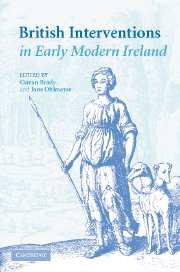Book contents
- Frontmatter
- Contents
- Notes on contributors
- Acknowledgements
- Aidan Clarke: an appreciation
- Conventions
- List of abbreviations
- 1 Making good: New perspectives on the English in early modern Ireland
- 2 The attainder of Shane O'Neill, Sir Henry Sidney and the problems of Tudor state-building in Ireland
- 3 Dynamics of regional development: processes of assimilation and division in the marchland of south-east Ulster in late medieval and early modern Ireland
- 4 The ‘common good’ and the university in an age of confessional conflict
- 5 The construction of argument: Henry Fitzsimon, John Rider and religious controversy in Dublin, 1599–1614
- 6 The Bible and the bawn: an Ulster planter inventorised
- 7 ‘That Bugbear Arminianism’: Archbishop Laud and Trinity College, Dublin
- 8 The Irish peers, political power and parliament, 1640–1641
- 9 The Irish elections of 1640–1641
- 10 Catholic Confederates and the constitutional relationship between Ireland and England, 1641–1649
- 11 Protestant churchmen and the Confederate Wars
- 12 The crisis of the Spanish and the Stuart monarchies in the mid-seventeenth century: local problems or global problems?
- 13 Settlement, transplantation and expulsion: a comparative study of the placement of peoples
- 14 Interests in Ireland: the ‘fanatic zeal and irregular ambition’ of Richard Lawrence
- 15 Temple's fate: reading The Irish Rebellion in late seventeenth-century Ireland
- 16 Conquest versus consent as the basis of the English title to Ireland in William Molyneux's Case of Ireland … Stated (1698)
- Principal publications of Aidan Clarke
- Index
9 - The Irish elections of 1640–1641
Published online by Cambridge University Press: 31 July 2009
- Frontmatter
- Contents
- Notes on contributors
- Acknowledgements
- Aidan Clarke: an appreciation
- Conventions
- List of abbreviations
- 1 Making good: New perspectives on the English in early modern Ireland
- 2 The attainder of Shane O'Neill, Sir Henry Sidney and the problems of Tudor state-building in Ireland
- 3 Dynamics of regional development: processes of assimilation and division in the marchland of south-east Ulster in late medieval and early modern Ireland
- 4 The ‘common good’ and the university in an age of confessional conflict
- 5 The construction of argument: Henry Fitzsimon, John Rider and religious controversy in Dublin, 1599–1614
- 6 The Bible and the bawn: an Ulster planter inventorised
- 7 ‘That Bugbear Arminianism’: Archbishop Laud and Trinity College, Dublin
- 8 The Irish peers, political power and parliament, 1640–1641
- 9 The Irish elections of 1640–1641
- 10 Catholic Confederates and the constitutional relationship between Ireland and England, 1641–1649
- 11 Protestant churchmen and the Confederate Wars
- 12 The crisis of the Spanish and the Stuart monarchies in the mid-seventeenth century: local problems or global problems?
- 13 Settlement, transplantation and expulsion: a comparative study of the placement of peoples
- 14 Interests in Ireland: the ‘fanatic zeal and irregular ambition’ of Richard Lawrence
- 15 Temple's fate: reading The Irish Rebellion in late seventeenth-century Ireland
- 16 Conquest versus consent as the basis of the English title to Ireland in William Molyneux's Case of Ireland … Stated (1698)
- Principal publications of Aidan Clarke
- Index
Summary
The Bishop of Rapho tells me your Ma[jes]tie was told all this Kingdom was disposed to trouble. It is wonderful how men are inclined nowadays to report all wherein I am concerned to ye worst possible source. For … there hath not been all this while the least appearance or complexion to any such thing, nor is there yett, or any likely to be, for any thing I can see. Nay Sir, after all their gaping upon me and after me, it will be found I have Estimation & Affection in the Places where I serve you.
The Irish parliament which met on 16 March 1640 was one that Thomas Wentworth, earl of Strafford, wanted, and it acted in a manner that appeared to support this sanguine view of his happy position in Ireland. The Commons' 235 members, 161 Protestants and 74 Catholics, gave him the most comfortable Protestant majority ever, and the Irish council declared that ‘we observe the Persons returned to serve this Parliament all generally so well affected and disposed to reason’. It held a perfunctory opening session on Monday 16 March at which Sir Maurice Eustace was unanimously selected as Speaker, and adjourned for two days, awaiting Wentworth's arrival from England. On its first full day's legislative business on the following Monday it agreed to four subsidies, and on 26 March sat at three o'clock in the afternoon ‘for the reading of the act of four intire subsidies the third time, for expedition of the business of the House’.
- Type
- Chapter
- Information
- British Interventions in Early Modern Ireland , pp. 186 - 206Publisher: Cambridge University PressPrint publication year: 2005



